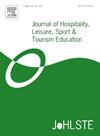Integrating augmented reality into event tourism education: Enhancing experiential value and authenticity
IF 4.1
2区 教育学
Q1 EDUCATION & EDUCATIONAL RESEARCH
Journal of Hospitality Leisure Sport & Tourism Education
Pub Date : 2025-08-14
DOI:10.1016/j.jhlste.2025.100571
引用次数: 0
Abstract
Cultural expositions have evolved from static displays to dynamic experiential platforms that integrate immersive technologies, fostering innovation in event organizing and management. In the field of event organizing education, these expositions provide an ideal setting for exploring immersive teaching methods and experiential learning strategies. This study examines the role of AR as a pedagogical tool in event organizing training, focusing on its impact on learners' experiential value, perceived authenticity, satisfaction and skill development. To address gaps in existing research, this study conducted an 18-week quasi-experimental investigation involving 120 undergraduate and postgraduate learners enrolled in event organizing programs in Taiwan. The learners, representing diverse cultural backgrounds, were divided into two groups: an experimental group, which engaged in AR-based event simulations, and a control group, which received traditional lecture-based instruction. Results demonstrated that AR-enhanced training significantly improved learners’ engagement, practical competencies, and ability to design immersive audience experiences. These findings highlight the potential of AR to transform event organizing education by bridging theory with practice, fostering deeper learner engagement, and preparing future event professionals with the skills necessary for real-world applications. This study offers practical implications for event educators, organizers, and industry stakeholders, advocating for the integration of AR-driven experiential learning into event organizing curricula to align with evolving industry demands.
将扩增实境融入事件旅游教育:提升体验价值与真实性
文化博览会已从静态展示演变为融合沉浸式技术的动态体验平台,促进了活动组织和管理的创新。在活动组织教育领域,这些展览为探索沉浸式教学方法和体验式学习策略提供了理想的环境。本研究考察了AR作为一种教学工具在事件组织培训中的作用,重点关注其对学习者体验价值、感知真实性、满意度和技能发展的影响。为了弥补现有研究的不足,本研究进行了为期18周的准实验调查,涉及120名参加台湾活动组织课程的本科生和研究生学习者。代表不同文化背景的学习者被分为两组:实验组进行基于ar的事件模拟,对照组接受传统的基于讲座的教学。结果表明,增强ar的培训显著提高了学习者的参与度、实践能力和设计沉浸式受众体验的能力。这些发现强调了AR通过将理论与实践联系起来,培养更深层次的学习者参与,并为未来的活动专业人员提供实际应用所需的技能,从而改变活动组织教育的潜力。这项研究为活动教育者、组织者和行业利益相关者提供了实际意义,倡导将ar驱动的体验式学习整合到活动组织课程中,以适应不断变化的行业需求。
本文章由计算机程序翻译,如有差异,请以英文原文为准。
求助全文
约1分钟内获得全文
求助全文
来源期刊
CiteScore
8.10
自引率
10.80%
发文量
41
审稿时长
42 days
期刊介绍:
The Journal of Hospitality, Leisure, Sport and Tourism Education (JoHLSTE) is the leading international, peer-reviewed educational journal for this subject grouping. Its aims are to: a) Promote, enhance and disseminate research, good practice and innovation in all aspects of higher education in Hospitality, Leisure, Sport and Tourism and Events to its prime audience including teachers, researchers, employers, and policy makers. b) Encourage greater understanding, links and collaboration across its constituent fields. JoHLSTE is designed to have maximum impact through it being available on-line, fully archived and peer-reviewed. JoHLSTE is divided into seven sections: Editorial; Academic Papers; Practice Papers, Perspectives, Comments and Rejoinders, Research Notes and Reports and Education Resource Reviews.

 求助内容:
求助内容: 应助结果提醒方式:
应助结果提醒方式:


